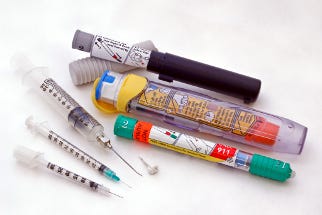FDA gives consumers tips on safe ways to dispose of 'sharps'
March 11, 2015

FDA sharps disposal tips
The U.S. Food and Drug Administration has launched a new website for patients and caregivers on the safe disposal of needles and other so-called "sharps" that are used at home, at work and while traveling.
The website will help people understand the public health risks created by improperly disposing of used sharps and how users should safely dispose of them.
Sharps is a term for medical devices with sharp points or edges that can puncture or cut the skin. Such medical devices include hypodermic needles and syringes used to administer medication; lancets or fingerstick devices to collect blood for testing; needle and tubing systems for infusing intravenous and subcutaneous medicines; and connection needles used for home hemodialysis.
After being used, many sharps end up in home and public trash cans or flushed down toilets. This kind of improper disposal puts people, such as sanitation workers, sewage treatment workers, janitors, housekeepers, family members and children at risk for needle stick injuries or infection with viruses such as Hepatitis B and C and Human Immunodeficiency Virus (HIV).
"Safe disposal of used needles and other sharps is a public health priority," says Jeffrey Shuren, M.D., director of the FDA's Center for Devices and Radiological Health. "This website provides information about how to keep used sharps from ending up in places where they could harm people."
With more diseases and conditions such as diabetes, cancer, allergies, arthritis and HIV being managed outside of hospitals and doctors' offices, the number of sharps used in homes and work offices is increasing. In addition, pets are being treated in homes and livestock are being treated on farms, which are also contributing to the increased number of sharps outside of veterinary hospitals.
The U.S. Environmental Protection Agency estimates that more than 3 billion needles and other sharps are used in homes in the United States each year.
Sharps disposal guidelines and programs vary by jurisdiction. For example, in 2008, California passed legislation banning throwing needles in household trash. Florida, New Jersey and New York have established community drop off programs at hospitals and other health care facilities. People using sharps at home or work or while traveling should check with their local trash removal services or health department to find out about disposal methods available in their area.
For the safe disposal of needles and other sharps used outside of the health care setting, the FDA recommends the following:
DO:
•Immediately place used sharps in an FDA-cleared sharps disposal container to reduce the risk of needle-sticks, cuts or punctures from loose sharps. (A list of products and companies with FDA-cleared sharps disposal containers is available on the FDA website. Although the products on the list have received FDA clearance, all products may not be currently available on the market.)
•If an FDA-cleared container is not available, some associations and community guidelines recommend using a heavy-duty plastic household container as an alternative. The container should be leak-resistant, remain upright during use and have a tight fitting, puncture-resistant lid, such as a plastic laundry detergent container.
•Keep sharps and sharps disposal containers out of reach of children and pets.
•Call your local trash or public health department in your phone book to find out about sharps disposal programs in your area.
•Follow your community guidelines for getting rid of your sharps disposal container.
DO NOT:
•Throw loose sharps into the trash.
•Flush sharps down the toilet.
•Put sharps in a recycling bin; they are not recyclable.
•Try to remove, bend, break or recap sharps used by another person.
•Attempt to remove a needle without a needle clipper device.
For more information:
•Needles and Other Sharps (Safe Disposal Outside of Health Care Settings)
•Improperly Discarded ‘Sharps' Can Be Dangerous—Consumer Update
The FDA, an agency within the U.S. Department of Health and Human Services, protects the public health by assuring the safety, effectiveness, and security of human and veterinary drugs, vaccines and other biological products for human use, and medical devices. The agency also is responsible for the safety and security of our nation's food supply, cosmetics, dietary supplements, products that give off electronic radiation, and for regulating tobacco products.
Source: FDA
.
About the Author(s)
You May Also Like


